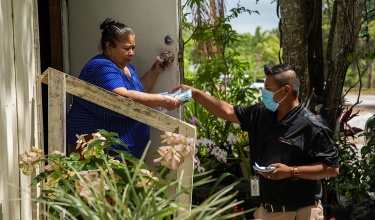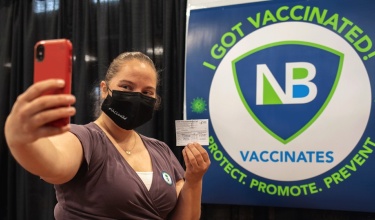PIH United States News
-

The Push Toward Health Equity in New Bedford, a City of Immigrants
Beyond the pandemic, PIH-US is partnering with New Bedford and local community organizations to establish a broader health equity agenda in this culturally diverse city that has weathered decades of economic and demographic shifts.
-
Why PIH-US Cares About the Build Back Better Act, And Why You Should Too
While the Senate debates the terms and details of the Build Back Better Act, it’s worth remembering that taken as a whole, many of the legislation’s provisions would transform public health, maternal health, and long-term care for millions of people across the nation.
Dec 13, 2021
-

Addressing Food Insecurity During the COVID-19 Pandemic and Beyond
Across the U.S., as people were forced to isolate, quarantine, or care for a relative sick with COVID-19, food assistance became essential. PIH-US worked with partners across the country to connect patients and families with food and strenghten connections to social support.
Nov 23, 2021
-

Three Ways Health Programs Reflect Diné Culture on Navajo Nation
In honor of Native American Heritage Month, we're highlighting three ways COPE health programs reflect Navajo culture, language, and traditional teaching.
Nov 19, 2021
-
RECOVER Project to Expand Access to COVID-19 Vaccination in U.S.
With a grant from the federal Health Resources and Services Administration, PIH-US is investing in community-based organizations to help more people in hard-hit communities get vaccinated.
Nov 01, 2021
-

Our Partners In The News: Monumental Women, Vaccines for Farmworkers, Accompaniment in Action
Work in support of partners across the U.S. continues with a focus on equity, access, and accompaniment.
Oct 26, 2021
-

Chicagoland Community Groups Focus on Neighborhoods to Increase Vaccination
With winter on the horizon and vaccination rates hovering around 50% in Chicago's Black and Latinx populations, the Chicagoland Vaccine Partnership took a unique approach to awarding grants to a range of community-based organizations.
Oct 25, 2021
-

Partners In Health Formalizes Long-Term Commitment to Health Equity Work in United States
What began as a time-bound initiative in response to a spiraling public health crisis has now catalyzed a long-term commitment to reimagining community health systems in the U.S. -- a fundamental component of PIH’s global mission to realizing health as a human right.
Oct 08, 2021
-

Our Partners in the News: From Boosting Vaccination Rates to Supporting Community Organizations
While much of the nation is struggling to increase vaccination rates, Newark, NJ scored a big win recently, nearly doubling its youth vaccination rate in two months, according to an article in NJspotlight.com.
Oct 01, 2021
-

Chicagoland Vaccine Partnership Brings Vital Health Services, and Trust, to Neighborhoods
The Chicagoland Vaccine Partnership brings together community-based organizations, public health experts, government officials, and philanthropists to focus on closing stark health equity gaps that have become more apparent during the pandemic.
Aug 25, 2021
-

How a ‘Little’ Modeling Tool Made a Big Difference Building a COVID-19 Response Workforce
Dr. John Welch faced a hiring challenge. It was April 2020, and the director of Partners In Health’s COVID-19 response in Massachusetts was on a tight deadline to determine how many people would be needed to launch an ambitious, statewide contact tracing workforce to help bring the newly raging pandemic under control.
Aug 23, 2021
-
In Massachusetts, Strengthening Health Systems Is Key to Curbing Pandemic
The Community Tracing Collaborative, PIH's contact tracing initiative with the Commonwealth and local boards of health, has helped hundreds of communities navigate a fast-moving pandemic—and local health liaisons were key to that partnership.
Aug 06, 2021
-
Anatomy of a Cape Cod Outbreak: How PIH’s Epidemic Intelligence Unit Supported a Major Public Health Investigation
A major COVID-19 cluster in Cape Cod was identified thanks to partnership between Massachusetts health officials and the PIH-supported Epidemic Intelligence Unit, leading to further clarity on the high transmission of the Delta variant and revised CDC guidelines on masking for vaccinated individuals.
Jul 30, 2021
-
What You Should Know About the Latest COVID-19 Surge and Delta Variant
A PIH expert answers critical questions about the current COVID surge, Delta variant, "breakthrough" infections, and what people can do to stay safe.
Jul 29, 2021
-

Innovative Strategies to Make COVID-19 Vaccinations More Accessible Across U.S.
Across the United States, public health workers and community leaders, businesses owners and President Joseph Biden are rolling out innovative strategies to reach the unvaccinated -- and nudge them to roll up their sleeves. PIH is helping them work creatively to stop the spread of COVID-19.
Jun 23, 2021
-
Case Studies: How Connecting People With the Essentials is Crucial to Pandemic Response
Care resource specialists have filled a crucial health care gap by ensuring people have the social, material, and other support they need to stay safe during the COVID-19 pandemic. Now, these specialists are also helping those hardest-hit gain greater access to life-saving vaccines.
Jun 03, 2021
-
Need to Know: Details on Biden's New Public Health Workforce Plan
The Biden Administration just announced a $7.4 billion investment in a public health workforce. Partners In Health applauds the decision to invest in our critical public health and community health workforces while we continue to battle the COVID-19 pandemic and the underlying inequities in the U.S. health system.
May 14, 2021
-

Vaccine Eligibility Does Not Guarantee Access
Every adult in the United States is now eligible for COVID-19 vaccines -- a critical milestone. As the nation races against a fourth wave of the virus and increasing spread of variants, vaccinating the entire population is as urgent as ever. But eligibility alone does not guarantee access.
Apr 29, 2021
-

Alleviating Stress in a Contact Tracing Workforce
Wellness & Peer Support program helps employees manage rising anxiety, emotional toll of pandemic
Apr 23, 2021
-

Envisioning a 21st Century Public Health Department in Pima County
Monoclonal antibody treatment is just one of many steps the southern Arizona county is taking toward improving access to care and accompaniment during COVID-19—and beyond
Apr 02, 2021